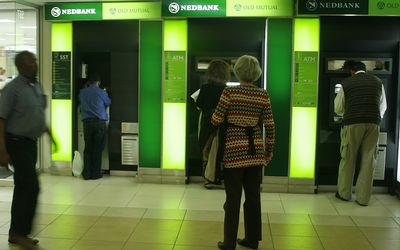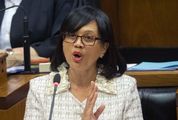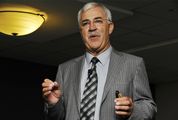Giving life to the National Development Plan
by Colin Anthony,
2013-12-04 10:08:36.0
NEDBANK completed its long-term vision, Fairshare 2030, prior to the release of the NDP. The commonalities were remarkable, and in the areas where it differed, the bank is now aligning its vision with the plan.
Fairshare’s goals, says Nedbank chief governance and compliance officer Thabani Jali, is to shape a sustainable future for the bank and for South Africa.
In developing the vision, the Nedbank strategists looked at the central challenges facing South Africa. Priding itself on being the “green bank”, they also considered wider environmental issues to shore up the plan’s long-term sustainability. The bank incorporated into its thinking the Millennium Development Goals, the United Nations Environment Programme and the UN Framework Convention on Climate Change.
The process of aligning Fairshare with the NDP has not reached approval stage, so Nedbank is not disclosing details. However, the eight goals identified in the Fairshare framework, have much in common with the NDP. They are to:
1. Reduce the impact of climate change through carbon reduction
2. Enable sustainable and manageable levels of water consumption by securing water quality and access
3. Enable optimal employment opportunities
4. Enable access to energy services
5. Enable affordable access to clean water and sanitation (water security)
6. Enable sufficient levels of savings and investment to support growth and development
7. Enable optimal health outcomes
8. Enable optimal education outcomes
“We are revisiting the eight challenges and looking at how we need to do each differently in relation to the NDP,” says Jali.
“While our eight goals preceded the NDP, the targets are aligned with it, and are relevant for the country and for our business as a bank,” says Brigitte Burnett, Nedbank’s head of sustainability. “They identify what we need to differently now for the future.”
Jali emphasises the importance of the NDP framework. “It’s a plan for where we’d like to end up. Business needs that and South Africa needs that. The NDP is a plan to take the country into the future; it looks forwards, not backwards.”
With fresh faces at the top, including National Planning Commissioner Miriam Altman as head of strategy, Telkom is taking on the challenges presented by the NDP with relish.
The first challenge is to ensure that the company plays a meaningful role in broadband rollout, to promote growth, employment and poverty reduction.
Altman is also intent on ensuring fruitful things happen once infrastructure is installed, things that speak to the overall goals of the NDP. “If we roll out infrastructure but it doesn’t get used properly, it’s a waste,” she says. “Just providing connectivity is ticking a box but achieving little.”
That means addressing what end users do with it. So when connecting a school online, it means ensuring there are appropriate online resources to access as well as ensuring there is the expertise among pupils, teachers and principals to know what resources are available online, and to be able to access those resources and know how to use them. This concept can be applied in numerous other areas such as rural medical clinics and job-seeking centres.
Much of the resources could be cloud-based, where users access resources online. “This would enable users to rely on lower-end devices, and the main costs would be incurred by the state or companies,” Altman says. “This approach would give life to the aim of bringing down the cost of living and improving access to public services. It could also be hugely beneficial to improving access to services for small and medium enterprises.”
The idea feeds into how broadband should be rolled out: “You need an outcomes-oriented approach emphasising the impact as opposed to one focused on ticking a box that inputs were delivered. So just installing pipes to schools to get them connected is wasteful if the school does not do anything with it.”
Telkom is implementing this philosophy in an ambitious new project funded by the Department of Communications, and partnered with the Department of Basic Education. It is rolling out connectivity to 1,651 schools to get them online by February 2014. It is using a cloud-based platform and includes the provision of end-user devices.
The plan is to use the outcome of this project to expand the concept to other schools, and similar programmes can be implemented in other areas such as health care and post-matric education.
The goal is to change social outcomes, as envisaged in the NDP, and technology is creating opportunities that are yet to be conceived.

Picture: SUNDAY TIMES
NEDBANK completed its long-term vision, Fairshare 2030, prior to the release of the NDP. The commonalities were remarkable, and in the areas where it differed, the bank is now aligning its vision with the plan.
Fairshare’s goals, says Nedbank chief governance and compliance officer Thabani Jali, is to shape a sustainable future for the bank and for South Africa.
In developing the vision, the Nedbank strategists looked at the central challenges facing South Africa. Priding itself on being the “green bank”, they also considered wider environmental issues to shore up the plan’s long-term sustainability. The bank incorporated into its thinking the Millennium Development Goals, the United Nations Environment Programme and the UN Framework Convention on Climate Change.
The process of aligning Fairshare with the NDP has not reached approval stage, so Nedbank is not disclosing details. However, the eight goals identified in the Fairshare framework, have much in common with the NDP. They are to:
1. Reduce the impact of climate change through carbon reduction
2. Enable sustainable and manageable levels of water consumption by securing water quality and access
3. Enable optimal employment opportunities
4. Enable access to energy services
5. Enable affordable access to clean water and sanitation (water security)
6. Enable sufficient levels of savings and investment to support growth and development
7. Enable optimal health outcomes
8. Enable optimal education outcomes
“We are revisiting the eight challenges and looking at how we need to do each differently in relation to the NDP,” says Jali.
“While our eight goals preceded the NDP, the targets are aligned with it, and are relevant for the country and for our business as a bank,” says Brigitte Burnett, Nedbank’s head of sustainability. “They identify what we need to differently now for the future.”
Jali emphasises the importance of the NDP framework. “It’s a plan for where we’d like to end up. Business needs that and South Africa needs that. The NDP is a plan to take the country into the future; it looks forwards, not backwards.”
With fresh faces at the top, including National Planning Commissioner Miriam Altman as head of strategy, Telkom is taking on the challenges presented by the NDP with relish.
The first challenge is to ensure that the company plays a meaningful role in broadband rollout, to promote growth, employment and poverty reduction.
Altman is also intent on ensuring fruitful things happen once infrastructure is installed, things that speak to the overall goals of the NDP. “If we roll out infrastructure but it doesn’t get used properly, it’s a waste,” she says. “Just providing connectivity is ticking a box but achieving little.”
That means addressing what end users do with it. So when connecting a school online, it means ensuring there are appropriate online resources to access as well as ensuring there is the expertise among pupils, teachers and principals to know what resources are available online, and to be able to access those resources and know how to use them. This concept can be applied in numerous other areas such as rural medical clinics and job-seeking centres.
Much of the resources could be cloud-based, where users access resources online. “This would enable users to rely on lower-end devices, and the main costs would be incurred by the state or companies,” Altman says. “This approach would give life to the aim of bringing down the cost of living and improving access to public services. It could also be hugely beneficial to improving access to services for small and medium enterprises.”
The idea feeds into how broadband should be rolled out: “You need an outcomes-oriented approach emphasising the impact as opposed to one focused on ticking a box that inputs were delivered. So just installing pipes to schools to get them connected is wasteful if the school does not do anything with it.”
Telkom is implementing this philosophy in an ambitious new project funded by the Department of Communications, and partnered with the Department of Basic Education. It is rolling out connectivity to 1,651 schools to get them online by February 2014. It is using a cloud-based platform and includes the provision of end-user devices.
The plan is to use the outcome of this project to expand the concept to other schools, and similar programmes can be implemented in other areas such as health care and post-matric education.
The goal is to change social outcomes, as envisaged in the NDP, and technology is creating opportunities that are yet to be conceived.




















Change: -0.47%
Change: -0.61%
Change: 0.53%
Change: -0.42%
Change: -2.12%
Data supplied by Profile Data
Change: -0.46%
Change: -0.19%
Change: -0.47%
Change: 0.00%
Change: -0.16%
Data supplied by Profile Data
Change: -1.11%
Change: -1.07%
Change: -0.63%
Change: -1.21%
Change: -1.24%
Data supplied by Profile Data
Change: 0.52%
Change: 1.25%
Change: 1.31%
Change: 0.18%
Change: 1.12%
Data supplied by Profile Data